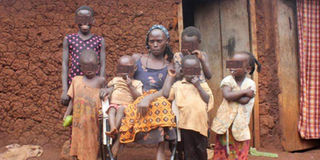Activists, district leaders demand health reforms

Abandoned. Ms Justine Nakabuye in front of her rented single room with some of her children. She is struggling to raise the seven children as a single mother after their fathers abandoned them. PHOTO BY FRED MUZAALE
What you need to know:
- Campaign. Health rights activists and community leaders want the government to institute public healthcare reforms to equip vulnerable groups with information about sexual and reproductive health to enable them make informed decisions.
KYANKWANZI. Justine Nakabuye, 42, a single mother living with disability, can hardly feed her seven children.
Nakabuye lives with her children in abject poverty in Kasambya Trading Centre, Watuba Sub-county in Kyankwanzi District.
The men who sired her seven children have abandoned them.
Nakabuye says her family sometimes goes hungry because she does not have money to buy food. The family depends on hand outs from well-wishers.
She struggles to pay Shs10, 000 rent every month for a room in a semi-permanent house where she lives with her children.
“They do not extend any help to me and all the children are not attending school,” she laments.
Nakabuye says had she been educated about family planning and its benefits, she would not have had all the seven children that she is now struggling to provide for.
Nakabuye is one of many men and women, who ended up with a large family that they can barely cater for because they were ignorant about family planning and its benefits.
Health rights activists, community groups and Kyankwazi District leaders last week launched a campaign to improve sexual reproductive health services.
The campaign is aimed at educating people about family planning, prevention and management of sexually transmitted diseases, and advocating quality obstetric and antenatal care.
During the launch of the campaign, health rights activists and community leaders called upon the government to institute public healthcare reforms to equip the grassroots vulnerable groups with information about sexual and reproductive health to enable them make informed decisions.
The stakeholders led by the Action for Rural Women Empowerment (ARUWE), a non-government organisation, stressed that the government must invest more resources into the country’s public healthcare system.
They also advocated improved district budgets for improved delivery of sexual and reproductive health services.
The health rights activists last week visited several homes in the villages of Wattuba and Nsambya in Kyankwanzi District to assess sexual and reproductive health services and their implementation.
They found delivery of sexual and reproductive health services wanting. Health rights activists said contraceptive use is low, leading to unintended pregnancies that have resulted into unplanned births, unsafe abortions and maternal deaths.
ARUWE with support from its partner Amplify Change, a non-governmental organistaion, has started working with Kyankwanzi District leaders to improve sexual and reproductive health services in Wattuba and Nsambya villages.
The ARUWE project coordinator in Kyankwazi and Kiboga districts, Mr Paul Nsanja, said the programme also targets women and other vulnerable people such as the youth, young girls and people living with HIV/ Aids.
He added that the project is aimed at advocating improved accessibility, availability and utilisation of quality sexual and reproductive health services by vulnerable people.
Mr Nsanja stressed the need to ensure that all health workers cultivate a positive attitude towards patients in order to encourage them to keep on utilising health facilities and seeking help from qualified health workers.
Addressing health sector stakeholders during a recent meeting in Ntwetwe Constituency, the Kyankwanzi District health officer, Dr John Bosco Sserebe, warned health workers against rude attitude towards patients, especially the vulnerable groups.
He said those who mistreat patients would be prosecuted.


